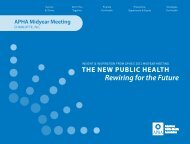EVIDENCE
missingevidence-digitalpdf-singlepages_2016
missingevidence-digitalpdf-singlepages_2016
You also want an ePaper? Increase the reach of your titles
YUMPU automatically turns print PDFs into web optimized ePapers that Google loves.
4.14 Evidence had emerged that raised “concern about the role of biofuels in rising food prices, accelerating<br />
deforestation and doubts about the climate benefits.” In February 2008, a paper by Searchinger et al in<br />
Science suggested that in the US, biofuels caused land use changes that led to increased net emissions<br />
of greenhouse gases. 52 This prompted the chief scientists of Defra and DfT to commission a review<br />
of the evidence behind the policy of increasing biofuel use and its indirect effects, and whether there<br />
should be a moratorium.<br />
4.15 The review was chaired by Professor Ed Gallagher, chair of the Renewable Fuels Agency<br />
(the independent agency created to implement the policy). It concluded that while there was no need<br />
for a moratorium and that “there is a future for a sustainable biofuels industry,” the rate of increase<br />
in the use of biofuels should be reduced to avoid agricultural land being displaced.<br />
4.16 Because the UK was committed to a rapid increase in the use of biofuels, and because the impact<br />
on food crops was controversial, the research and recommendations could have been awkward<br />
for the government. It appears that, because of a collaborative effort between researchers and civil<br />
servants to ensure that counter-evidence and uncertainty were properly addressed during the research,<br />
it was possible to publish the final report within six months of the research being commissioned.<br />
4.17 The effect of mobile phones on health<br />
Media stories and campaign groups claimed that mobile phones and transmitter masts were causing<br />
cancer, despite a balance of scientific evidence to the contrary. An independent expert group on mobile<br />
phones had concluded in 2000 that although mobile phones and transmitters are unlikely to cause<br />
disease, further research was required to address possible biological effects of low-level radiofrequency<br />
radiation. The Mobile Telecommunications and Health Research (MTHR) programme was set up<br />
in 2001 to commission and oversee this research, jointly funded by government and the mobile<br />
phone industry.<br />
4.18 The MTHR’s research spanned 11 years, and concluded that there was no association between<br />
mobile phone use and cancer. The MTHR’s committee was effective in commissioning controversial<br />
and complex research and communicating it to the public. The interposing of an independent<br />
committee helped government to publish reliable research in a framework that was recognised<br />
by commentators as independent.<br />
4.19 The Depleted Uranium Oversight Board<br />
The Ministry of Defence set up this independent board to oversee the development of a laboratory test<br />
to check for exposure to depleted uranium (DU) amongst veterans of the Gulf War and other conflicts<br />
in the early 1990s. The board included established scientists, veterans’ groups and campaigners,<br />
to ensure that a broad range of views was considered. It concluded that there was no detectable<br />
exposure to DU. The research was published without delay, alongside a minority review that questioned<br />
the validity of the test.<br />
Research commissioners and researchers working together to set questions<br />
and agree on publication<br />
4.20 Organisational preparedness for unconventional terrorist attacks<br />
Research into how prepared public and private organisations are to respond to chemical, biological,<br />
radiological or nuclear terrorist incidents has been published promptly and in full, notwithstanding<br />
concerns that the findings or even the questions could be seen as identifying weaknesses in national<br />
security. Researchers, civil servants and other stakeholders met to discuss the questions to be asked,<br />
research methods and ways to communicate findings to the public. Such events appear to help build<br />
trust between academics and those commissioning research.<br />
52 Searchinger, T et al (2008)<br />
33 SECTION 4: REMEDIES AND RECOMMENDATIONS



